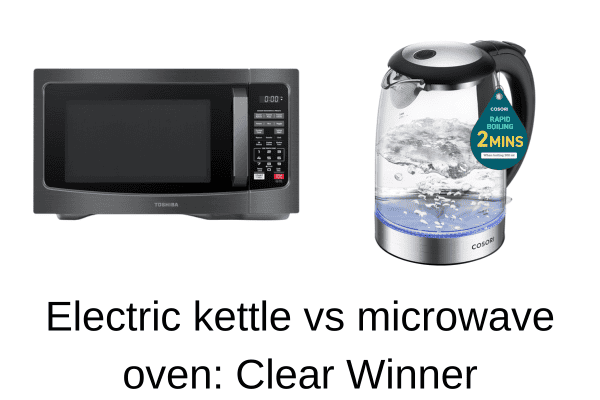You’re in a hurry, craving a hot drink and deciding between an electric kettle vs microwave. I’ve tried both in my kitchen, chasing that perfect balance of speed and taste.
Think of the kettle as a sprinter and the microwave as a steady marathoner. Both get you there, but in different ways. Next, we’ll explore energy use, convenience, and how each feel in real life. Stick around, and we’ll find the best fit for your daily routine.
Contents
What Is an Electric Kettle?
An electric kettle is a small machine that heats water with a hidden coil. It acts like a cozy jacket for your water, warming it from the inside without wasting heat. I remember my first time using one in college it felt magical to press a button and get hot water in moments.
If you compare an electric kettle vs microwave, many say the kettle wins for quick, even heating.
Key Uses
I love using my kettle for tea, coffee, and instant noodles it’s like a trusty friend in my kitchen. Some folks enjoy the faster boil time and automatic shut-off, which help them avoid overboiling or messy spills. The simple process and handy design make the kettle easy to grab, fill, and pour whenever you crave a hot drink or need water for a fast meal.
What Is a Microwave?
A microwave is like a tiny magic box that heats food using invisible waves. Instead of warming from the outside in like a stove or kettle it sends microwaves straight into the food, making water molecules dance and generating heat. Ever noticed how a microwave can heat soup unevenly, with some parts boiling while others stay lukewarm? That’s because it doesn’t stir heat naturally like boiling water, but it’s hard to beat for quick warming.
Primary Functions
Microwaves are the multitaskers of the kitchen. They reheat leftovers, cook frozen meals, pop popcorn, and, yes, even heat water. Some people prefer using a microwave instead of a kettle, especially when warming a single cup. When comparing an electric kettle vs microwave, the microwave wins in versatility it does way more than boil water. But does that mean it’s the best choice? That depends on what you need most.
Speed of Heating
Boiling Speed
If you’re in a rush and need hot water fast, the electric kettle vs microwave debate gets interesting. A kettle is like a sprinter it uses direct heat to bring water to a rolling boil in about 2-4 minutes, depending on the amount. On the other hand, a microwave is more like a jogger, taking anywhere from 3-5 minutes to heat a single cup and longer if you’re warming more.
I once timed both while making tea. My electric kettle took under three minutes to bring water to a full boil, while my microwave needed nearly four and the heat wasn’t evenly distributed. The kettle’s rapid heating and built-in auto shut-off make it a clear winner for speed and convenience. But a microwave might do the trick if you only warm a small cup and don’t mind stirring.
Energy Use and Efficiency
Power Consumption
When comparing electric kettle vs microwave, energy use depends on how each appliance heats water. Electric kettles use direct heating, sending power straight to a heating coil. This makes them fast and efficient. Microwaves heat water using waves, but some energy is lost, warming the cup and air.
A kettle usually runs on 1500-3000 watts, while microwaves use 800-1500 watts. But power rating alone doesn’t tell the whole story. Kettles may use more power at once, but they heat faster, reducing total energy use. Microwaves take longer, which can make them less efficient for boiling water.
Eco-Friendly Tips
What is the best way to save energy? Only heat the water you need. Filling a kettle to the top wastes electricity if you only need one cup. Heating too much water takes longer with a microwave, and uneven heat means you might have to reheat it.
A kettle with an automatic shut-off helps prevent overheating. If using a microwave, stir the water after heating to lower the temperature. Small habits like these make a difference in your daily energy use.
Taste and Quality of Heated Water
Flavor Differences
Have you ever noticed how tea or coffee tastes better when made in a kettle? It’s not just in your head. When comparing electric kettles to microwaves, many people swear by kettles for a cleaner, fresher taste. That’s because kettles heat water evenly, allowing proper oxygen levels to remain, which can enhance flavor.
Microwaved water, on the other hand, sometimes has an odd, flat taste. Some people even report a slight plastic or chemical flavor, especially if heating water in a non-glass container. This happens because microwaves heat unevenly, creating “hot spots” that can affect the water’s composition. While personal preference plays a role, a kettle usually wins for a smooth, consistent flavor.
Safety Considerations
Handling Hot Water
Burns from hot water happen faster than you think. When comparing an electric kettle vs microwave, the way you handle hot water makes a big difference in safety. With a kettle, you pour carefully from a spout, controlling the flow. But with a microwave, you’re grabbing a cup of superheated water, which can spill unexpectedly.
Have you ever pulled a mug from the microwave and felt the bottom was incredible while the water inside was boiling? That’s the tricky part microwaves heat unevenly. If you stir too fast or bump the cup, the water can erupt suddenly, leading to burns. With a kettle, the heat is more evenly distributed, and the handle stays cool, reducing the risk of accidents.
Built-in Safety Features
One significant advantage of kettles is the auto shut-off feature. The moment the water reaches boiling, the kettle turns off no guesswork, no overheating. This means no wasted electricity and no risk of forgetting about it.
Microwaves, on the other hand, stop heating once the timer runs out. While that prevents overheating, it doesn’t mean the water is always at the right temperature. Plus, microwaves don’t have the same level of spill control as a kettle’s spout. Safety is your top priority, so an electric kettle is usually the better choice.
Cost and Convenience
Upfront Cost
When comparing electric kettle vs microwave, price is often a deciding factor. A fundamental electric kettle can cost anywhere from $20 to $80, depending on features like temperature control or insulation. Microwaves, on the other hand, start around $50 and can go up to $300 for higher-end models with innovative technology.
A kettle is a more budget-friendly choice if you need hot water. But a microwave might be a better investment if you’re looking for an all-in-one appliance that heats leftovers, cooks meals, and warms beverages. It depends on what you’ll use more often.
Kitchen Space
Space is another significant factor. If your kitchen is small, do you really have room for both? A kettle takes up minimal counter space and can be stored easily. Microwaves, however, demand a dedicated spot especially if they’re large or mounted above a stove.
For someone with a compact kitchen or a dorm room, choosing between the two matters. A kettle is easier to tuck away when not in use, while a microwave becomes a permanent fixture.
Everyday Ease
A kettle is the ultimate convenience for hot drinks. Fill it, press a button, and boil water in minutes. There is no need to watch the timer or stir to distribute heat evenly, making it a favorite for tea lovers and coffee drinkers.
A microwave, however, does more than just heat water. It can be the more versatile choice if you reheat leftovers, cook oatmeal, or melt butter regularly. But a kettle wins for sheer simplicity regarding quick and effortless boiling.
When Each Option Makes Sense
Best for Quick Hot Beverages
An electric kettle is a game-changer if you’re a tea lover or coffee drinker. It heats water fast, keeps the temperature consistent, and makes your morning routine effortless. Just fill, press, and pour no guessing, no stirring, just hot water ready.
I’ve tried making tea in the microwave, but it’s never quite the same. The water heats unevenly; sometimes, it’s either scalding hot or barely warm. If you love your tea strong and flavorful or need boiling water for instant noodles in a hurry, a kettle is hands-down the better choice.
Check the price best Electric kettle on Amazon
Best for Multi-Purpose Cooking
If you’re looking for versatility, the microwave wins. It doesn’t just heat water it warms up soups, oatmeal, and leftovers with a button. Whether you’re melting butter for baking or steaming vegetables for a quick meal, a microwave does more than boil water.
I often use my microwave for a late-night snack when I don’t want to fire up the stove. It’s a one-stop appliance for heating all kinds of food, making it ideal for those who prefer convenience over single-purpose tools. If you need an all-around kitchen helper, the microwave makes more sense. But for hot drinks and boiling water, the kettle remains unbeaten.
Check the price best microwave oven on Amazon
Final Thoughts
When it comes to electric kettles vs microwaves, both have strengths. A kettle is a clear winner if you want fast, reliable boiling water for tea, coffee, or instant noodles. It heats evenly, turns off automatically, and keeps water hot longer. On the other hand, if versatility matters more, a microwave can do it all warming up leftovers, cooking simple meals, and heating water when needed.
The best choice depends on your lifestyle. A kettle will make your life easier if you drink tea daily or love a perfect cup of coffee. However, a microwave might be more practical if you need a multi-purpose kitchen tool for reheating food and quick meals.
At the end of the day, why not try both? See which fits your routine better and makes your daily life more convenient. Whether you’re a team kettle or a team microwave, the most important thing is having hot water ready when you need it.

